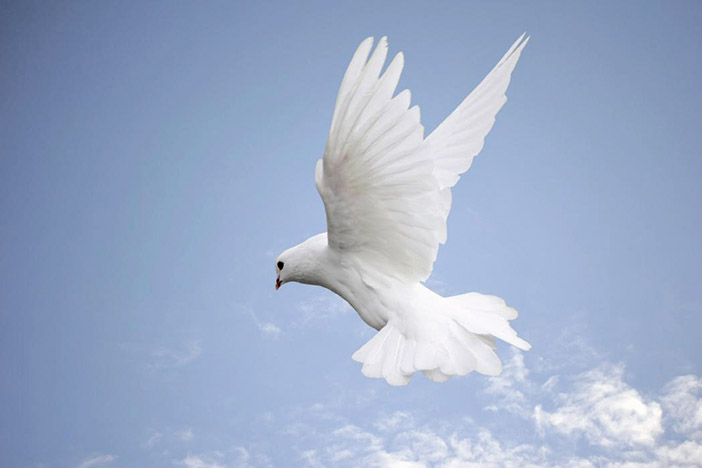
What is unique about the qualities of the dove that succeeded in fulfilling Noach’s mission, returning with an olive branch?
Rav Shlomo Pesach Toperoff, z”tl, author of “The Animal Kingdom in Jewish Thought,” explains that the word Yonah is derived from yanah, “to oppress or maltreat,” or from anah, “to mourn.” These derivations are alluded to in Tanach. For example, whereas Yeshayahu said (38:14), “I do moan as a dove,” Yechezkel (7:16) referred to “the doves of the valleys, all of them moaning,” and Nachum (2:8) recalls “her handmaids moan as with the voice of doves.”
Before email or text messaging, the carrier pigeon proved to be a worthy and excellent courier, dispatching messages over long distances, with amazing precision. However, whereas the carrier pigeon is aided by human effort, the dove is not dependent upon human assistance. The dove is a master of its destiny and uses initiative. Instead of a freshly torn olive leaf, the dove could have just as easily found a leaf floating on the water. A fresh green olive leaf, however, indicated to Noach that the waters had considerably decreased as the olive tree is not tall. Furthermore, the olive tree, explains the gemara (Meseches Menachos, 53B), does not drop its leaves in the summer or rainy season for the leaves are always fresh and sturdy.
Strange that the dove, fond of sweet foods, favored the leaf of an olive, which is bitter. Here, the gemara (Meseches Eruvin, 18B) provides a remarkable explanation symbolically attributed to the dove: “Let my food be as bitter as the olive leaf, provided that it comes from Hashem rather than be as sweet as honey, and I be dependent upon the gifts of man.” We echo the dove’s impressive sentiment in benching: “Let us not be in need either of the gifts of mortals or of their loans but only of Your helping hand.”
The dove is invested with a host of virtues, all of which are symbolic of Klal Yisroel. Its strong flight is succinctly highlighted by Dovid Hamelach: “Oh that I had wings like a dove!” (Tehillim 55:7). Bereishis Rabbah 39 comments that all birds apart from the dove fly, and when they grow weary they rest on top of a tree or a rock, but the dove merely folds one of her wings and flies with the other. This characteristic has been interpreted to mean that the nations of the world need both wings, land and culture, to maintain their existence, but Klal Yisroel can fly and soar to great heights even on one wing, namely its culture, which is the Torah. Furthermore, as the dove saves herself only by her wings, so too Klal Yisroel is saved only by the merit of the Torah.
Moreover, in Shir Hashirim Rabbah (1:63), it states that as the dove from the hour she recognizes her mate does not change from him, so too Klal Yisroel, from the time we recognized Hashem we have not changed from Him. This passage speaks to conjugal fidelity, and may throw some light on the nature of the sin-offering that a woman after childbirth must bring to the alter. “And when the days of her purification are fulfilled… she shall bring a young pigeon or a turtledove for a sin-offering” (Vayikra, 12:6). This offering indicates that the woman was pure before marriage, and that she is always faithful. In this manner, we equate the purity of married life among humans with the fidelity of the dove toward its mate.
Rabbi Akiva explained (Medrash Tanchuma, Parshas Shemos, 29), “Similar to a bird that cannot fly without wings, so too our nation cannot stand without its elders.” A story is narrated in the gemara (Meseches Shabbos, 130A) concerning a teacher called Elisha who was called “The Man of Wings.” The Roman government issued a decree that any Jew found wearing tefillin would have his brains pierced. Elisha disregarded the decree, put on his tefillin, and walked into the street. When a Roman sentry recognized him, Elisha attempted to run, took off his tefillin and held them in his hand. Elisha was quickly overtaken, and when asked what he held in his hand he replied, “The wings of a dove.” The rabbis asked, why did Elisha reply with these words? Because Klal Yisroel is likened to a dove, “Knesses Yisroel domeh l’yonah,” just as a dove is protected by its wings, so is Klal Yisroel protected by its mitzvos.
By Mordechai Plotsker
Mordechai runs a popular 10-minute nightly shiur on the Parsha with a keen interest on the invigorating teachings of the Berdichever Rav, the Kedushas Levi. To learn more about the nightly shiur including dial-in information, visit www.shiurenjoyment.com. Mordechai resides in Hillside, New Jersey, with his wife and children and can be reached by email at [email protected].










